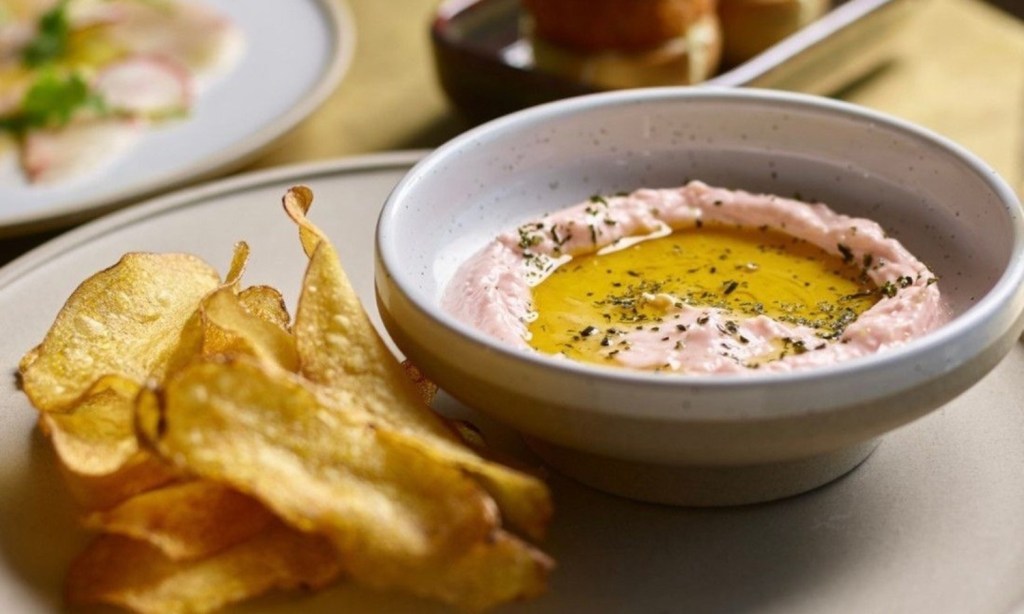Unlike most Sydneysiders, my first taste of taramasalata didn’t come from The Apollo or off a supermarket shelf but from a bar in New York. I couldn’t tell you what bar, nor could I recall if I actually enjoyed it, but when I returned to Sydney, my godmother introduced me to Fresh Fodders, a supermarket taramasalata. From the first dip of a salty corn chip, I was hooked on the pale pink fish dip. I am still a little too hooked, if I’m being honest, considering it’s how we start every family Friday night dinner (Yes, like Gilmore Girls). That and a gin martini. The perfect pairing.
However, until recently, taramasalata had always been something you walk past on supermarket shelves or ordered as a starter in Greek restaurants like The Apollo. It was still finding its footing here; meanwhile, in New York, it had invaded bar menus. So you can imagine my surprise when I spotted the beloved pink dip on the menu at Lil Sis, a chic Parisian wine bar in Chippendale, and again a few months later at Bar Messenger, a wine bar hiding behind a wall-sized painting in Circular Quay.
Since then, I’ve noticed the pale pink dip on wine bar menus across the city—specifically wine bars. You know what they say: two is a coincidence, and three is a pattern. So, it begs the question, has taramasalata reached a new height of cool?
Let’s rewind it to the beginning.
What is taramasalata? The dip hails from Greece and Turkey, where it’s served as a meze to dip or spread. It’s made from tarama, the salted and cured roe of a cod or carp. You will find many variations of it, from smoked to a beige colour. The popular pink colour is actually an artificial addition. Some would say it’s to make it more enticing.
Alexis Georgiou, head chef at Abercrombie and Lil Sis, admits the vibrant pink colour is a major draw for his diners. As a wine bar, food is considered the side dish to the main—wine. Though food is still an important component, it just means the food served is typically designed to complement the wines and centred around small plates, tapas, charcuterie, cheese boards, and other light bites. Everything taramasalata is.
Lil Sis sources its taramasalta from Delizie Dal Celio, a local family producer. “Everything is made by hand, and it’s quite a small batch, so more love and patience goes into making it, which is why people love it,” says Georgiou.
“It’s been on the Lil Sis menu from the beginning, and it’s a dish I always like to put on a menu as it’s colourful and a terrific light snack that isn’t too fishy on the palate.”
Taramasalata’s popularity in bars isn’t just about the dip itself; it’s also about the creative and unexpected pairings that bartenders are coming up with. Picture this: a plate of taramasalata accompanied by vegetable crisps served alongside a pale red chilled grenache blend. The contrasting textures and flavours are memorable.
“It pairs perfectly with wines with a saline character, such as Fino Sherrys and Albariño,” says Georgiou.
It’s safe to say the creamy, briny Greek-Turkish dip has reached a new height of cool, but we can’t neglect the precursive supermarket taramasalata. After all, it’s one of the reasons it has become so popular.
Fresh Fodder, found on Woolworths and Harris Farm Markets shelves, is perhaps one of the most well-known and well-loved brands in the taramasalata game. In my opinion, it’s the best tasting of all supermarket brands.
According to Fiona Schofield of Fresh Fodders, there’s a reason why the taramasalata tastes good, and it could honestly be a Hollywood plot.
“It all started with a gangster, a brothel, and a pawn shop,” she says.
Long story short, in the late 70s, young Max Schofield spent his days in his dad Jim’s Crows Nest deli, playing cricket with local kids. The deli shared a building with a brothel upstairs and a pawn shop next door owned by a reputed gangster.
One morning, Jim intervened when he witnessed a beating in the back lane. The beaten man, a Greek, reappeared weeks later, grateful for his rescue. He shared a family recipe, taramosalata, a little-known creamy dip to Australians. Max cherished this gift and, as time passed, turned it into a successful business, fulfilling his childhood dream and honouring his late father’s legacy.
While Fresh Fodders makes other dips, such as tzatziki, hummus, and more, taramosalata is the flagship product. Since then, they’ve added a smokey taramosalata and a white taramosalata.
However, Schofield says in the early eighties, when Fresh Fodders was born, the environment was dominated by Anglo-Saxons, unwilling to try new things.
“Getting people to try it was challenging back then, but now we have this incredible multicultural food landscape. Our timing now couldn’t be better,” says Schofield.
A quick survey around town reveals Fresh Fodders is the most recognisable taramasalata brand on supermarket shelves, so it should come as no surprise Fresh Fodders is invading the food service world.
“It’s funny, we’ve watched slowly as restaurants start putting it on their menus,” giggles Schofield before she adds, “We’re getting a lot more interest from the wine bar scene. They want to offer something that’s tasty and a bit interesting.”
Though, as with any food trend, the future is unwritten.
“Food peaks and troughs in the same way fashion does. I think at the moment taramasalata is very fashionable.”
Related: 13 of the Cosiest Wine Bars in Sydney to Duck into on a Chilly Night
Related: The Next Big Drink Trend Comes In Teeny Tiny Martini Glasses
Read more stories from The Latch and subscribe to our email newsletter.

